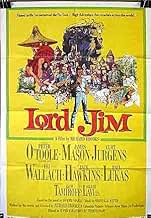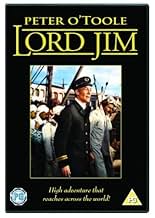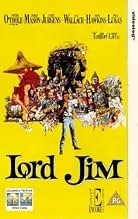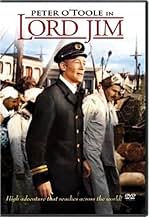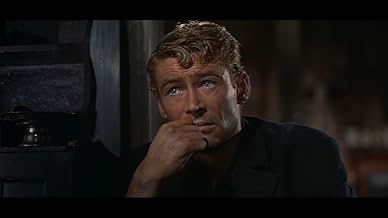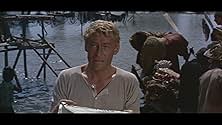AVALIAÇÃO DA IMDb
6,7/10
4,5 mil
SUA AVALIAÇÃO
Depois de ser considerado um covarde, um marinheiro do século 19 vive com um único propósito: se redimir.Depois de ser considerado um covarde, um marinheiro do século 19 vive com um único propósito: se redimir.Depois de ser considerado um covarde, um marinheiro do século 19 vive com um único propósito: se redimir.
- Direção
- Roteiristas
- Artistas
- Indicado para 2 prêmios BAFTA
- 2 indicações no total
Curd Jürgens
- Cornelius
- (as Curt Jurgens)
Jûzô Itami
- Waris
- (as Ichizo Itami)
Rafiq Anwar
- Moslem Leader
- (as Rafik Anwar)
- Direção
- Roteiristas
- Elenco e equipe completos
- Produção, bilheteria e muito mais no IMDbPro
Avaliações em destaque
Lord Jim is one of those great works of fiction that is best watched after having read the novel, or at least a solid summary of the book. Without this background, the movie could be hard to understand. I also found that it was helpful to watch the film twice. Since some of the details of the movie do not square with those of the novel, it was a bit confusing at times to follow the sequence of the movie, and a second viewing brought all of that into focus. In my opinion, the motion picture does capture quite well the spirit of the book, if not the absolute letter.
I actually found Peter O'Toole's depiction of the lead character to be a quite good representation. He is just as naive and disoriented a character in the movie as in the book. His heroics in the movie are appropriately tempered with self-doubt, and his ultimate fate squares with the novelist's intent for his hero/anti-hero.
I enjoy watching movies of this kind to see how a director and actors visualize the plot of their respective novels, and to me Lord Jim was not a disappointment.
I actually found Peter O'Toole's depiction of the lead character to be a quite good representation. He is just as naive and disoriented a character in the movie as in the book. His heroics in the movie are appropriately tempered with self-doubt, and his ultimate fate squares with the novelist's intent for his hero/anti-hero.
I enjoy watching movies of this kind to see how a director and actors visualize the plot of their respective novels, and to me Lord Jim was not a disappointment.
Conrad's novels,like those of Pasternak,are often read more for the mood and the tone than for the plot.In certain cases,the facts are the least important aspect.In my opinion,this is the state of "Lord Jim".The middle part does appear to be similar to a cross between a Tarzan movie,any film revolt against oppression,and "Treasure Island".Oh,but isn't Wallach's General,philosophical and sadistic,evily wise and perceptive,a vast improvement on the original?Sherif Ali was a crook,masquerading as a religious fanatic.The appearance of the pirates,however,enjoyable as it is,really proves to undermine Conrad's intrention.This is a bungled robbery,and Mason's sterling performance shows us a clever and insightful crook manipulating a dupe.In the original,the pirates appear almost as an instrument of fate,allowing Jim to destroy himself.Brown is Jim's unrecognized alter-ego;without acknowledging his own dark impulses,and dealing with them constructively,he(and the rest of us as well) fouls up his career and life.Everything else considered,this is still an enjoyable film,and a great tale of adventure.Watch it,but read the novel when it comes time to do the book report.
I have seen the film three times over the past thirty years and each time I loved it. The subject of the film must have attracted director Richard Brooks who was essentially a screenplay writer who later became a director. He knew the merits of a strong script with philosophical lines from Conrad. Coppola was to use the related original material (Conrad's) in his "Apocalypse Now" for the Brando scenes several decades after this film was made and mostly forgotten.
What Brooks does not realize is that lines like "it only takes a split second to make a coward a hero or turn a hero into a coward" and "every sinner wants a second chance at redemption, without realizing he is damned for ever" are philosophical lines that one expects to hear from very literate individuals. Here, in "Lord Jim," the lines are often spoken by the dregs of society. Jim, of course, we are told by the narrator (Jack Hawkins' Marlowe) was philosophical, dreamed of heroism, and was a gentleman.
The film is made up of three distinct segments: 1. the "sinking" of SS Patna 2. The liberation of Patusan ("Patna" + "us" make up the name Patusan, remarks Jim to his love) and 3. The battle with a group of scoundrels (led by James Mason's 'Gentleman' Brown) with some fine speeches on honor, death, and fear.
Each segment could stand alone but together the film adds considerable worthiness that exceeds the action and plot, the elements that most viewers use to judge a movie. The lesser characters in the film add color and counterpoints to the script. Christian Marquand's French Captain who defends Jim's "cowardice" with the words "fear can make us do strange things" or Paul Lukas' Stern who compares his dead butterfly collection with the "wonderful, perfect human beings that God created" or the native who wonders why some pray to one god instead of a host of Gods are a few examples of dialogs that force you to reflect on what you heard.
The film's subject covers several religions. The fervent Muslims on the way to Haj survive the storm. The Christian Jim prays to his God. The Buddhists pray to Buddha. And the natives pray to their array of gods (a touch of Hinduism?). Yet, the film is not a religious film. But faith in God is underlined at every stage.
Conrad was Polish and a seaman before he became a writer. Brooks is an American. O'Toole leads a cast that is predominantly British. Daliah Lavi is Israeli, Marquand is French, Jurgens is German...The film is truly international.
Brooks not only wrote and directed the film but this was the first film that he produced. The film proved to be ideal for O'Toole reprising his roles of "Lawrence of Arabia" and "Becket", roles that draw thin lines between cowardice and heroism and consequent attempts to redeem oneself. The film is not great cinema--but will remain for me cinema based on related major literary works ("Lord Jim" and "Heart of Darkness", both narrated by the fictional Marlow) adapted for the screen with some delightful performances from O'Toole, Mason, Wallach, and Marquand and commendable photography by Freddie Young.
What Brooks does not realize is that lines like "it only takes a split second to make a coward a hero or turn a hero into a coward" and "every sinner wants a second chance at redemption, without realizing he is damned for ever" are philosophical lines that one expects to hear from very literate individuals. Here, in "Lord Jim," the lines are often spoken by the dregs of society. Jim, of course, we are told by the narrator (Jack Hawkins' Marlowe) was philosophical, dreamed of heroism, and was a gentleman.
The film is made up of three distinct segments: 1. the "sinking" of SS Patna 2. The liberation of Patusan ("Patna" + "us" make up the name Patusan, remarks Jim to his love) and 3. The battle with a group of scoundrels (led by James Mason's 'Gentleman' Brown) with some fine speeches on honor, death, and fear.
Each segment could stand alone but together the film adds considerable worthiness that exceeds the action and plot, the elements that most viewers use to judge a movie. The lesser characters in the film add color and counterpoints to the script. Christian Marquand's French Captain who defends Jim's "cowardice" with the words "fear can make us do strange things" or Paul Lukas' Stern who compares his dead butterfly collection with the "wonderful, perfect human beings that God created" or the native who wonders why some pray to one god instead of a host of Gods are a few examples of dialogs that force you to reflect on what you heard.
The film's subject covers several religions. The fervent Muslims on the way to Haj survive the storm. The Christian Jim prays to his God. The Buddhists pray to Buddha. And the natives pray to their array of gods (a touch of Hinduism?). Yet, the film is not a religious film. But faith in God is underlined at every stage.
Conrad was Polish and a seaman before he became a writer. Brooks is an American. O'Toole leads a cast that is predominantly British. Daliah Lavi is Israeli, Marquand is French, Jurgens is German...The film is truly international.
Brooks not only wrote and directed the film but this was the first film that he produced. The film proved to be ideal for O'Toole reprising his roles of "Lawrence of Arabia" and "Becket", roles that draw thin lines between cowardice and heroism and consequent attempts to redeem oneself. The film is not great cinema--but will remain for me cinema based on related major literary works ("Lord Jim" and "Heart of Darkness", both narrated by the fictional Marlow) adapted for the screen with some delightful performances from O'Toole, Mason, Wallach, and Marquand and commendable photography by Freddie Young.
The double edge of humanity: fear and courage. In his darkest hour, Lord Jim finds a redeeming path of self-sacrifice facing his past and the burden of a dramatic split-second decision. A coward´s decision aboard the Patna? Heroes before the action, dreaming of epic challenges often "freeze" in the face of danger. The survival instinct is in clear contradiction to the strong desire of young Jim to do good. Peter o´Toole reveals a dramatical and deep performance, outstandingly faithful to Conrad´s masterpiece. James Mason is superb giving life to an ignominious as well as charming dark face of evil. The vivid colour of the jungle and the thick river myst create the perfect atmosphere for this dark novel(with a major future influence in Coppola´s "Apocalypse now"). In this film you can see portrayed the all time dilema of our lives. Everyone in his or her lifetime will sometimes have to make a decisive split-second decision, that will change irreversibly his life and that of others. If it is the wrong decision, will we ever have a chance of redemption?
Based on the novel, this movie is not only representative of the period piece that Joseph Conrad's story was, but also of movie-making at that time (1965). It's an epic story told in the way that they did back then --sweeping landscapes, exotic locales, hundreds of extras, good performances and many questions regarding philosophical and practical values. At times a bit clunky and unexplained, the movie is a study in movie-making during that era.
It brings up the same issues that Conrad did in his book, sometimes so much so that the dialog feels as though it is dragging. O'Toole's character emotes plenty, despite acting flat for a good portion of the first third. The scene between him and James Mason is the spark of the piece. At 2:34, this movie flounders and drags in the middle. Still, it's a good piece to watch.
It brings up the same issues that Conrad did in his book, sometimes so much so that the dialog feels as though it is dragging. O'Toole's character emotes plenty, despite acting flat for a good portion of the first third. The scene between him and James Mason is the spark of the piece. At 2:34, this movie flounders and drags in the middle. Still, it's a good piece to watch.
Você sabia?
- CuriosidadesThe crew and cast were joined by Cambodian translator Dith Pran, who was a liaison between Cambodians and the filmmakers and stars. He left the country after the 1975 Communist takeover and his own imprisonment, and his story was told in Os Gritos do Silêncio (1984).
- Erros de gravaçãoWhen Jim is going up river, one of his companions throws a knife into another's back, but the knife is already in his back as he turns to warn Jim.
- ConexõesFeatured in Um Cara Muito Baratinado (1982)
Principais escolhas
Faça login para avaliar e ver a lista de recomendações personalizadas
- How long is Lord Jim?Fornecido pela Alexa
Detalhes
- Tempo de duração
- 2 h 34 min(154 min)
- Proporção
- 2.20 : 1
Contribua para esta página
Sugerir uma alteração ou adicionar conteúdo ausente



